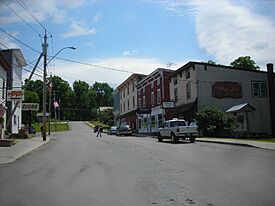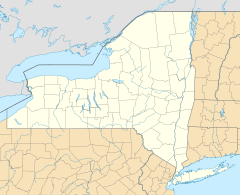Harrisville, New York facts for kids
Quick facts for kids
Harrisville, New York
|
|
|---|---|
|
Hamlet and CDP
|
|
 |
|
| Country | United States |
| State | New York |
| County | Lewis |
| Town | Diana |
| Area | |
| • Total | 0.83 sq mi (2.15 km2) |
| • Land | 0.79 sq mi (2.03 km2) |
| • Water | 0.05 sq mi (0.12 km2) |
| Elevation | 807 ft (246 m) |
| Population
(2010)
|
|
| • Total | 628 |
| • Estimate
(2019)
|
604 |
| • Density | 768.45/sq mi (296.87/km2) |
| Time zone | UTC-5 (Eastern (EST)) |
| • Summer (DST) | UTC-4 (EDT) |
| ZIP code |
13648
|
| Area code(s) | 315 |
| FIPS code | 36-32424 |
| GNIS feature ID | 952291 |
Harrisville is a small community in Lewis County, New York, United States. It is known as a hamlet and a "census-designated place." This means it's a small settlement that the government counts for population data.
Harrisville used to be a village. However, in 2018, the people living there voted to dissolve the village government. The population of Harrisville was 628 people at the 2010 census. It is located in the northeastern part of the town of Diana.
Contents
History of Harrisville
Harrisville has a long and interesting history. It started with land purchases and grew into an important center.
Early Beginnings
In 1815, Joseph Bonaparte bought a large piece of land. He was the older brother of the famous French leader, Napoleon I. Part of this land later became the town of Diana.
Harrisville got its name from Foskit Harris. He settled there in 1833. Foskit Harris built a sawmill and a gristmill. These mills used the power of the West Branch of the Oswegatchie River. They helped process wood and grain.
Growth and Industry
For about 20 years, Harrisville did not grow much. Then, in 1859, Samuel H. Beach and William R. Dodge built a huge tannery. A tannery is a place where animal hides are turned into leather. Their tannery was very long, about 228 feet (69 meters). It had many vats and could make a lot of leather each year. This tannery closed in 1902.
By 1880, Harrisville became a busy place. It was the main center for business and industry in the town of Diana. The area had many forests and a good water supply. These natural resources helped new businesses grow. There was a factory that made chairs. Another factory made sashes and doors. Many lumber dealers also operated there.
Other businesses supported the community. These included carriage makers and blacksmiths. There was also a harness shop. Many general stores and services like barbershops and hotels helped the town thrive.
Railroad and Paper Mills
The Carthage & Adirondack Railroad arrived in Harrisville in 1887. This railroad was very important. It replaced an older, less successful railroad. The new railroad transported leather, lumber, and paper from Harrisville's mills. It also brought visitors to vacation spots like Lake Bonaparte. Today, the old train depot is home to the Town of Diana Historical Museum.
Around 1905, the Diana Paper Company built a paper mill. It was built where the old tannery used to be. This mill mainly made paper for magazines and catalogs. The company faced money problems during World War I. It went bankrupt in 1927.
Later, the St. Regis Paper Company bought the mill. They ran it until 1954. Then, the Harrisville Paper Company bought it. The mill finally stopped working in 1957.
Geography
Harrisville is located in the northern part of the town of Diana. It is also along the northern border of Lewis County. The community is near the town of Pitcairn in St. Lawrence County.
In 2010, Harrisville had a total area of about 0.83 square miles (2.15 square kilometers). Most of this area was land. A small part, about 0.05 square miles (0.12 square kilometers), was water.
Two main roads, New York State Route 812 and New York State Route 3, pass through Harrisville. Route 3 goes east to Tupper Lake and west to Watertown. Route 812 goes south to Lowville, which is the county seat of Lewis County. It also goes north towards Gouverneur.
Harrisville is located on the West Branch of the Oswegatchie River. This river flows north and eventually reaches the St. Lawrence River at Ogdensburg.
Population Data
| Historical population | |||
|---|---|---|---|
| Census | Pop. | %± | |
| 1880 | 353 | — | |
| 1890 | 617 | 74.8% | |
| 1900 | 639 | 3.6% | |
| 1910 | 921 | 44.1% | |
| 1920 | 900 | −2.3% | |
| 1930 | 896 | −0.4% | |
| 1940 | 832 | −7.1% | |
| 1950 | 868 | 4.3% | |
| 1960 | 842 | −3.0% | |
| 1970 | 836 | −0.7% | |
| 1980 | 937 | 12.1% | |
| 1990 | 703 | −25.0% | |
| 2000 | 653 | −7.1% | |
| 2010 | 628 | −3.8% | |
| 2019 (est.) | 604 | −3.8% | |
| U.S. Decennial Census | |||
The population of Harrisville has changed over the years. In 1880, there were 353 people. The population grew to over 900 people by 1910 and 1920. Since then, the number of residents has slowly decreased. In 2010, 628 people lived in Harrisville. By 2019, the estimated population was 604.
In 2000, there were 653 people living in Harrisville. Most of the people were White. About 28.6% of households had children under 18. The average age of people in Harrisville was 40 years old.
See also
 In Spanish: Harrisville (Nueva York) para niños
In Spanish: Harrisville (Nueva York) para niños



